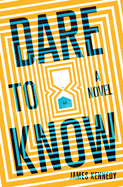
Learning the exact time and date of your death with guaranteed 100% accuracy is the service being sold. $20,000 is the price tag. The problem: a salesman for the algorithm decides to run the calculations on himself and discovers he should have died 23 minutes earlier. James Kennedy's Dare to Know takes the nameless narrator, and readers, on a propulsive, genre-defying trip down the rabbit hole of life's defining moments. At the same time, Kennedy meticulously hones in on the truths that seem essential at different stages of life.
The narrator helps refine the physics of thanatons (death particles), leading to a mathematical algorithm that predicts precisely when a person will die; he becomes an integral part of a start-up company named Sapere Aude that sells this information. One drunken night at a hotel conference for the company, the staff decides to do the strictly forbidden and test it out on one of their own for laughs. The results indicate a colleague will die in six minutes. Nervous laughter fades away as a countdown to six minutes begins. They check and double-check the math for mistakes. None are found. The group's attention shifts to the look on their colleague's face as he dies from an undiagnosed health condition. Bad for him, but the event sparks attention-grabbing headlines and high demand for their start-up's services.
Now called Dare to Know, the company rides the self-created wave of a multimillion-dollar industry for years, until others attempt to copy its success by offering a less accurate but much cheaper version of the same service. Dare to Know's founders sell the company to a faceless conglomerate and the narrator, suffering financially after a nasty divorce, can no longer afford an office space. He's relegated to commission-based sales, taking meetings in strip-mall locations to convince clients to pay $20 grand for the service. The prestige that once accompanied the practical aspect of planning for a client's long or short future has devolved to a do-I-really-need-to-know-this and can-I-get-it-cheaper-elsewhere viewpoint.
The narrator starts to feel like a door-to-door salesperson scraping for pennies instead of the rich, rock-star purveyor of a life-changing process. ("Is it a smell I give off? Some chump pheromone?") One day, after a disappointing deal at a coffee shop in which the client humiliates him ("She's making a scene--this is why we used to do it in an office, not in public--and she's wailing! breaking down!"), he swerves off the road while driving home in a snowstorm. Immobile and awaiting road service, he picks up his "Books of the Dead" and--yielding to depression and temptation--calculates his own death. He's aghast to find he should have been dead already, causing him to question everything leading up to his landing in a roadside ditch. He once had more money than he knew what to do with, and a woman who loved him and whom he loved back. All that the narrator once held true and dear has been stripped away. But he realizes he might have a second chance, since he seems to have cheated death. He decides to look for the one person who made him happy--his former wife, Julia--and to get his life back on track before death claims him for real, whenever that may be.
Kennedy shines in presenting elemental truths that will resonate with readers: "Do you fall in love with someone because you understand them? Not at nineteen. It's their otherness that draws you in. At nineteen you're collecting people. Trying on different ways of being. At nineteen I always scanned girlfriends' bookshelves, full of dead giveaways. Of course she would have that book. But they would surprise me, too. Challenge me, expand me. (During my affairs in my thirties? Didn't care what they read.)"
The author also nails it in capturing the nuances of a romantic relationship. While remembering an early date with Julia, the narrator states, "One of the reasons she ended up liking me was that I hadn't laughed at her when she fell that night. I couldn't understand--who laughs when a girl falls on her ass?" And when that relationship goes sour: "I was a sh**ty twenty-five-year-old who couldn't take his head out of his ass long enough to move to Bloomington and be happy with someone who loved him."
The story isn't entirely cynical or riddled with romantic issues. Splashes of humor appear, like when a drunk guy at a wedding tries to explain the famous Plato's Cave allegory to someone who has a philosophy degree: "Like, there's a cave, right?... And there are people stuck in the cave--they've been there since they were babies, they've never left, it's f**ked up, they're chained there, they don't ask why. Do you get it so far?"
With Dare to Know, Kennedy transitions from writing YA novels (The Order of Odd-Fish) to authoring an eye-popping adult novel spanning multiple genres. Time shifting from present to past, and possibly the future, Kennedy seamlessly integrates philosophy, first love, Beatles music, jaw-dropping science fiction and the four stages of civilization, and turns it all into a fast-paced, existential, mind-expanding thriller--a thoroughly enjoyable read. --Paul Dinh-McCrillis

